June 3, 2025 | 00:50 GMT +7
June 3, 2025 | 00:50 GMT +7
Hotline: 0913.378.918
June 3, 2025 | 00:50 GMT +7
Hotline: 0913.378.918
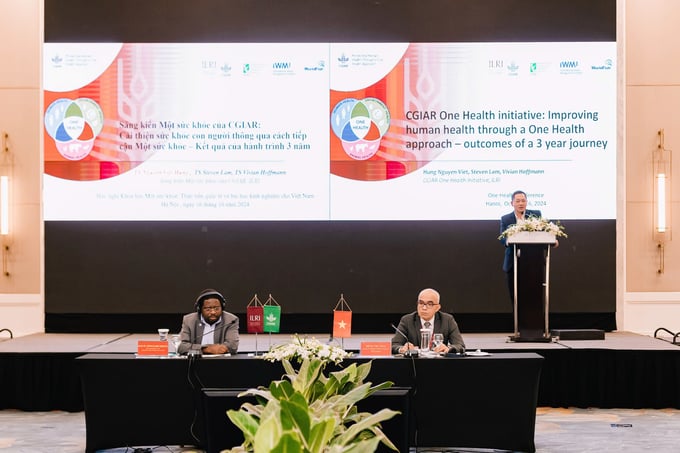
Dr. Hung Nguyen-Viet presented at the International One Health Scientific Conference on October 16th. Photo: Tung Dinh.
The International One Health Scientific Conference: International Practices and Lessons Learned for Vietnam was led by the Ministry of Agriculture and Rural Development (MARD) and the International Livestock Research Institute (ILRI) on October 16th. At the conference, Vietnam Agriculture Newspaper interviewed Dr. Hung Nguyen-Viet about mobilizing resources to advance One Health efforts.
Dr. Hung Nguyen-Viet is the Leader of Health Program at ILRI and the leader of the CGIAR initiative on One Health.
VAN: First, how has the CGIAR's One Health initiative contributed to advancing One Health efforts in Vietnam?
Dr. Hung Nguyen-Viet: The CGIAR’s One Health initiative is implemented by the ILRI and its partners in Vietnam. The goal is to improve human health through a One Health approach. Over the past three years, we have focused on three main areas.
The first area is research on zoonotic diseases, those transmitted from animals to humans. In this phase, we concentrated on diseases transmitted from captive wildlife in specific areas of Vietnam to humans, particularly in Dong Nai province.
We investigated the wildlife production value chain in Vietnam and analyzed pathogenic factors, especially viruses, within both animal and human communities. We collected samples from people, wildlife, and the surrounding environment, giving us insights into the prevalence of various viruses, including both known and newly discovered ones. This research helps us develop prevention measures to control the transmission of diseases from animals to humans.
The second focus of the One Health initiative in Vietnam is on interventions aimed at improving food safety at two critical points with high risks: traditional markets. These markets often lack proper hygiene and sanitation standards, and their infrastructure is insufficient to ensure food safety. We also target slaughterhouses, which are hotspots for food safety issues.
Our interventions aim to mitigate risks in these key areas to ensure safer food practices. Since simplicity and low cost are key criteria, we aim to improve the practices of meat vendors in traditional markets and workers in small slaughterhouses.
Finally, the last area we are working on, which is still in its early stages, involves studying antibiotic use in livestock farms, especially small- and medium-scale poultry and pig farms in various provinces of Vietnam.
The proper use of antibiotics in farming is essential to minimizing antimicrobial resistance (AMR). AMR is a significant global health issue, and it is crucial that we address it at the farm level. Promoting responsible antibiotic use helps prevent resistance, ensuring these drugs remain effective in the future.
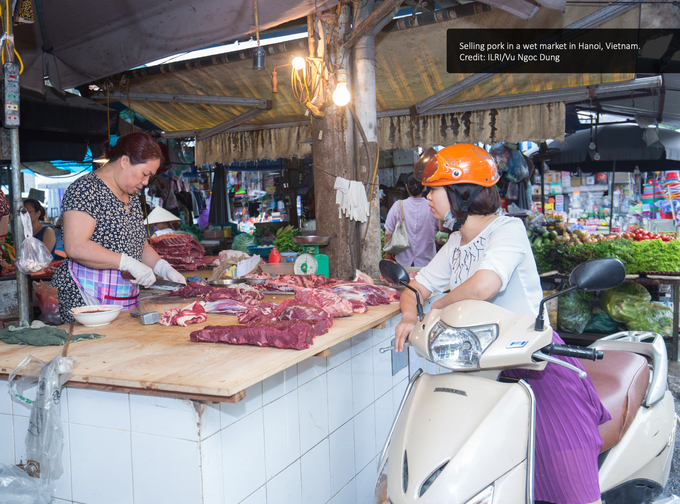
VAN: Recently, there were cases in Vietnam where four tigers died in Dong Nai and several mass food poisoning incidents occurred due to ingredients supplied to schools and industrial zones from wet markets. What are your thoughts on these issues?
Dr. Hung Nguyen-Viet: Those issues are typical examples of a One Health approach, highlighting the need for an interdisciplinary and collaborative approach. This requires the involvement of multiple sectors, including veterinary services, healthcare, and provincial institutions such as disease control centers, as well as professionals in environmental management. They must work closely together to monitor risks and intervene promptly to prevent such incidents.
With a growing population, combined with infrastructure and hygiene practices that have yet to meet necessary standards, ensuring food safety becomes increasingly challenging. Specifically, food in schools or industrial zones, where large numbers of people or vulnerable groups are concentrated, needs stricter control. This involves tracking the origin of food and ensuring proper food processing practices.
Research by ILRI and its partners in Vietnam has identified one of the biggest food safety risks is cross-contamination in kitchens and households. The improper handling of food, such as mixing cooked and raw foods or using the same cutting boards and knives, can lead to the transmission of harmful pathogens.
We hope that the findings from ILRI’s studies will encourage homemakers and food handlers to adopt better practices in household kitchens, communal kitchens, and school canteens, helping to reduce the risk of food poisoning in Vietnam. I am proud to say that although this is a relatively small initiative, I believe it is a very promising step in the right direction.
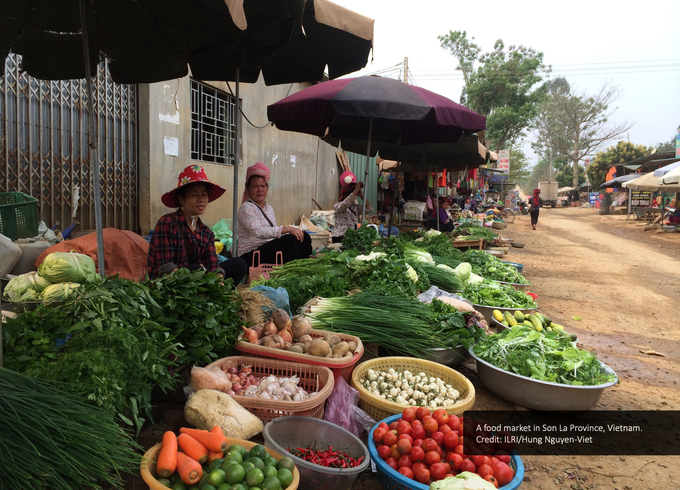
VAN: Could you elaborate on the One Health Hub initiative, or the grassroots-level One Health teams?
Dr. Hung Nguyen-Viet: I believe that establishing local One Health hubs is one of the most important initiatives moving forward. When we conducted fieldwork in local areas, we noticed that One Health models and their implementation at the grassroots level were quite weak.
This is why creating local One Health hubs presents a great opportunity for the community. For example, these hubs could bring together local stakeholders, such as students, researchers, university faculty members, and community members, allowing them to collaborate and work closely on One Health initiatives in the areas where they live and work.
In this way, disease risks can be identified at the local level. At the grassroots, local stakeholders understand the issues and can practice the One Health approach together. This presents a great opportunity for the practical application of One Health principles, whether in preventing zoonotic diseases, ensuring food safety, or tackling antimicrobial resistance. As a result, the process becomes more effective.
Moreover, bringing the One Health approach to local communities enables provinces and cities to access additional resources and funding to implement it. This is far more efficient than waiting for international organizations or higher-level officials to address local issues.

VAN: From a broader global perspective, how do you evaluate the One Health approach worldwide?
Dr. Hung Nguyen-Viet: Each country has its own unique characteristics, and we believe that evidence-based research is essential. We need to continue gathering more evidence and sharing it with One Health partners across different countries. Interestingly, and as part of a global trend, many countries are developing One Health partnerships, just like in Vietnam, Kenya, and Côte d’Ivoire.
Our research initiatives are always connected with national One Health partnerships because these partnerships act as mechanisms for coordinating different sectors and ministries.
The hope is that research evidence will inform concrete interventions and attract further investments. I think this is crucial because, while there is a lot of discussion about One Health and monitoring systems, local and national investments remain insufficient, especially in countries in the Global South.
I don’t believe the issue is whether One Health is important, but rather whether it is prioritized. When policymakers and resource providers see One Health as a priority in their action plans, that’s when real progress can happen. However, researchers like us still have work to do in terms of advising and communicating effectively to make stakeholders aware of its importance.
Looking ahead, if international support for developing countries is combined with the internal resources of more developed nations, and we cooperate closely, we can create shared benefits and common resources to implement the One Health approach more effectively across countries.

(VAN) On June 1, a grand meeting was held in Ha Long city, Quang Ninh province, to celebrate World Environment Day and launch the National Action Month for the Environment 2025.

(VAN) From the meeting in Ha Long, the United Nations called for the establishment of a legally binding global treaty to end plastic pollution.
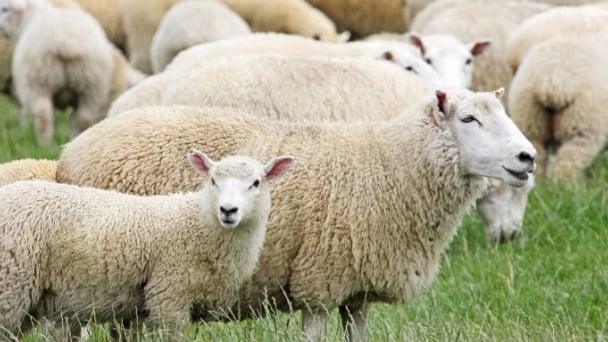
(VAN) ‘Accounting trick’ to support methane-emitting sectors undermines fight against climate change, say researchers.

(VAN) Water conservation, transboundary cooperation and sustainable agriculture are key to securing the region’s future, says FAO Director-General QU Dongyu.
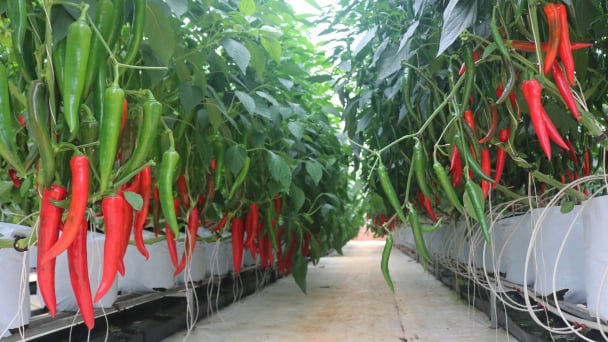
(VAN) Professor Dr. Mai Trong Nhuan believes that Lam Dong will serve as a 'supermarket' of green agricultural products for the entire country and a beautiful destination acting as a 'health charging station' for tourists.

(VAN) A delegation of nearly 50 Vietnamese agencies, agribusinesses, and agricultural associations has officially begun its working trip to the United States.

(VAN) Mr. Van Ngoc Thinh, CEO of WWF-Vietnam, warned that plastic waste is the starting point of a chain of ecological degradation and the decline of coastal livelihoods.